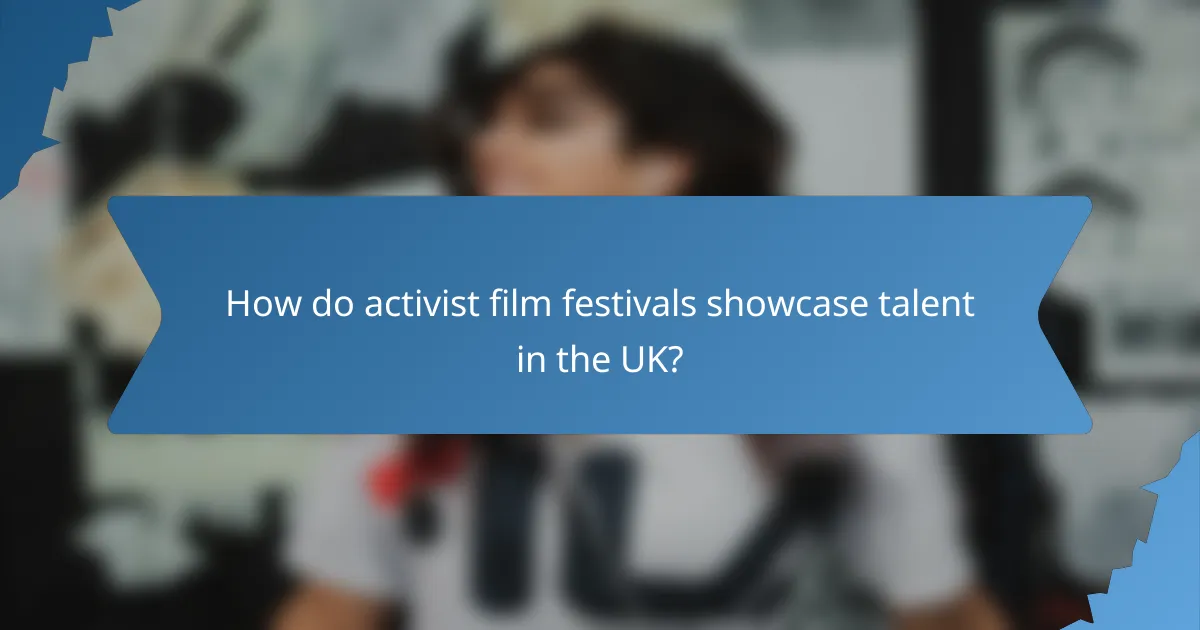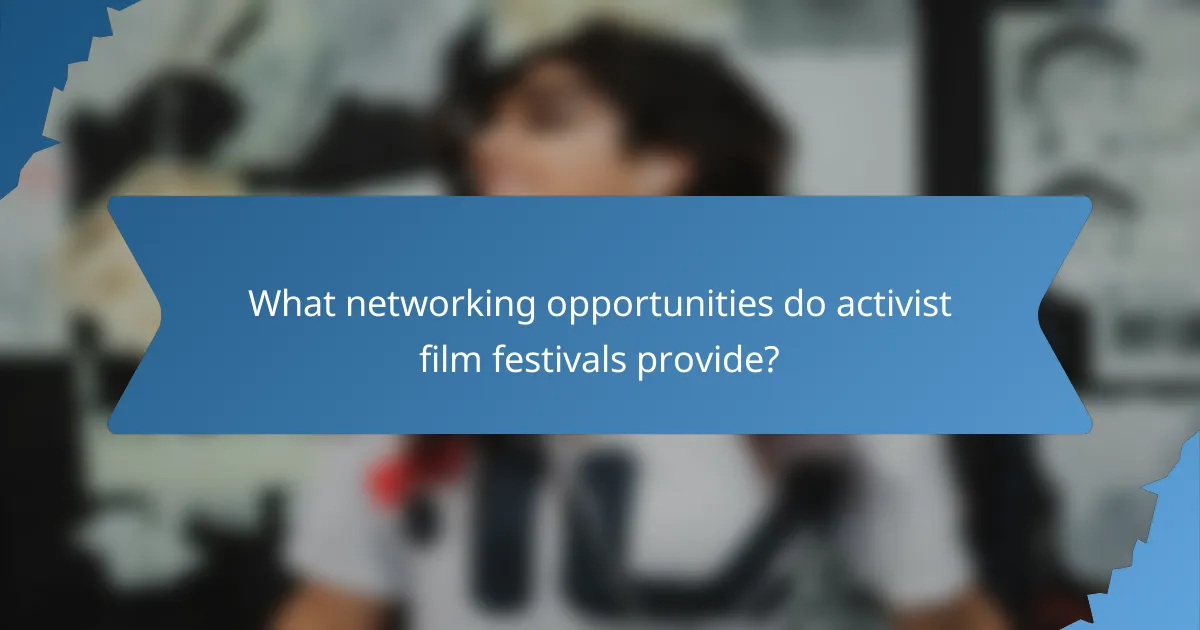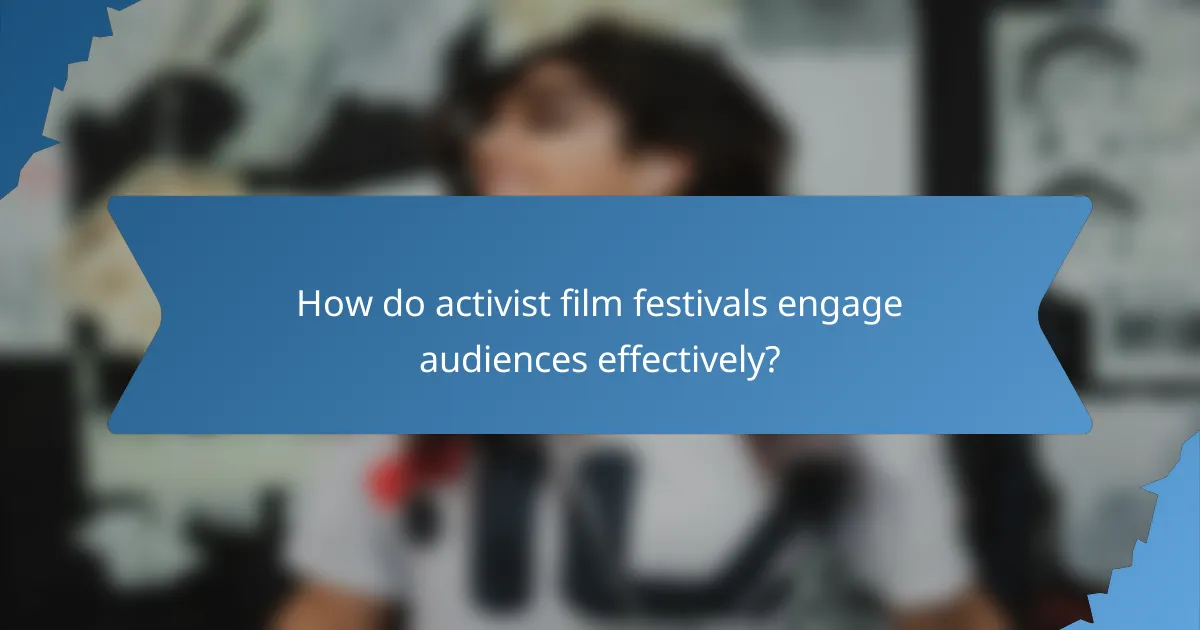Activist film festivals in the UK play a crucial role in showcasing the work of filmmakers dedicated to social change, providing them with a platform to reach engaged audiences. These festivals not only highlight pressing social issues but also create valuable networking opportunities, connecting creators with industry professionals and activists. By fostering immersive experiences and encouraging dialogue, they enhance audience engagement and promote meaningful discussions around important topics.

How do activist film festivals showcase talent in the UK?
Activist film festivals in the UK serve as vital platforms for showcasing talent by providing filmmakers with opportunities to present their work to engaged audiences. These events not only highlight important social issues but also foster connections between creators, activists, and viewers.
Highlighting emerging filmmakers
Emerging filmmakers often use activist film festivals to debut their work, gaining visibility and recognition. These festivals typically feature a dedicated section for new talent, allowing fresh voices to share their perspectives on pressing issues.
By including competitions and awards for best short or feature films, festivals encourage participation from novice filmmakers, helping them to build their portfolios and gain industry exposure.
Screening impactful documentaries
Documentaries play a crucial role in activist film festivals, as they often tackle significant societal challenges. These screenings provide audiences with in-depth insights into various issues, from climate change to human rights abuses.
Festivals may curate a selection of documentaries that resonate with current events, ensuring that the content is both relevant and thought-provoking, which can lead to increased audience engagement and discussions.
Featuring panel discussions with activists
Panel discussions featuring activists are a staple of activist film festivals, offering audiences the chance to engage directly with the issues presented in the films. These discussions often include Q&A sessions, allowing for a deeper exploration of the topics at hand.
Such interactions can inspire attendees to take action, whether through advocacy, volunteering, or further education on the issues discussed.
Promoting local talent
Local talent is often spotlighted at activist film festivals, showcasing filmmakers from the surrounding community. This focus helps to create a sense of belonging and encourages local audiences to support their neighbors’ creative endeavors.
By highlighting local stories and issues, festivals can foster a stronger connection between filmmakers and their communities, leading to increased awareness and activism.
Collaboration with film schools
Many activist film festivals collaborate with film schools to provide students with real-world experience in filmmaking and event organization. These partnerships can include mentorship programs, workshops, and opportunities to screen student films.
Such collaborations not only enhance the educational experience for students but also contribute to a diverse lineup of films that reflect a range of perspectives and styles.

What networking opportunities do activist film festivals provide?
Activist film festivals offer diverse networking opportunities that connect filmmakers with industry professionals, NGOs, and audiences passionate about social change. These events create a platform for collaboration, knowledge sharing, and potential partnerships that can amplify the impact of activist films.
Connecting filmmakers with industry professionals
Activist film festivals serve as a meeting ground for filmmakers and industry professionals, including producers, distributors, and agents. These connections can lead to funding opportunities, distribution deals, and mentorship, enhancing the filmmakers’ careers and the reach of their projects.
Networking events such as panels, Q&A sessions, and informal gatherings allow filmmakers to showcase their work and discuss their vision directly with industry insiders. Engaging in these settings can significantly increase the chances of securing support for future projects.
Facilitating partnerships with NGOs
Many activist film festivals partner with non-governmental organizations (NGOs) to promote social issues highlighted in the films. These collaborations can help filmmakers access resources, expertise, and networks that NGOs provide, which are essential for effective advocacy.
By attending these festivals, filmmakers can meet representatives from NGOs who are interested in their work, potentially leading to joint campaigns or initiatives that leverage the film’s message for greater social impact.
Organizing workshops and masterclasses
Workshops and masterclasses at activist film festivals offer filmmakers practical skills and insights from experienced professionals. These sessions cover various topics, such as storytelling techniques, funding strategies, and effective advocacy through film.
Participating in these educational opportunities not only enhances filmmakers’ craft but also expands their professional networks. Engaging with peers and mentors during these workshops can lead to collaborative projects and valuable industry contacts.

How do activist film festivals engage audiences effectively?
Activist film festivals engage audiences by creating immersive experiences that foster discussion and connection. They utilize various strategies, including interactive sessions, outreach programs, and social media, to enhance audience involvement and promote meaningful dialogue around important social issues.
Interactive Q&A sessions
Interactive Q&A sessions allow audiences to engage directly with filmmakers and activists, fostering a deeper understanding of the film’s themes. These sessions typically follow screenings and can last anywhere from 30 minutes to an hour, depending on audience interest and the number of questions posed.
To maximize engagement, festivals should encourage attendees to prepare questions in advance and provide platforms for anonymous submissions. This approach can help facilitate open discussions, especially on sensitive topics.
Community outreach programs
Community outreach programs extend the festival’s impact beyond the screening venue, bringing films to schools, community centers, and local organizations. These programs often include workshops, discussions, and film screenings that target specific demographics, such as youth or marginalized groups.
Effective outreach requires collaboration with local leaders and organizations to tailor content to community needs. By involving local voices, festivals can create a more inclusive environment and encourage broader participation.
Utilizing social media for engagement
Social media serves as a powerful tool for engaging audiences before, during, and after the festival. Platforms like Instagram, Twitter, and Facebook can be used to share behind-the-scenes content, promote events, and facilitate discussions among attendees.
Festivals should create dedicated hashtags to streamline conversations and encourage audience participation. Regular updates and interactive content, such as polls or live streams, can help maintain interest and foster a sense of community among participants.

What are the key criteria for selecting films at activist film festivals?
Key criteria for selecting films at activist film festivals include their relevance to pressing social issues, the quality of storytelling, and the diversity of perspectives represented. These factors ensure that the films not only entertain but also provoke thought and inspire action among audiences.
Relevance to social issues
Films showcased at activist film festivals must directly address significant social issues, such as climate change, human rights, or social justice. The relevance of a film is often evaluated based on its ability to resonate with current events and movements, making it timely and impactful.
For example, a documentary highlighting the struggles of marginalized communities can effectively raise awareness and foster dialogue. Festivals often prioritize films that align with their specific themes or missions, ensuring a focused approach to activism.
Quality of storytelling
The quality of storytelling is crucial in engaging audiences and conveying important messages. Films that combine strong narratives with compelling visuals tend to leave a lasting impression. Effective storytelling can transform complex social issues into relatable experiences, making them accessible to a broader audience.
Festivals look for films that utilize creative techniques, such as character development and emotional arcs, to enhance their narratives. A well-told story not only captivates viewers but also motivates them to take action on the issues presented.
Diversity of perspectives
Diversity of perspectives is essential for presenting a holistic view of social issues. Films that include voices from various backgrounds—such as different ethnicities, genders, and socioeconomic statuses—can enrich the conversation around activism. This inclusivity helps to highlight underrepresented narratives and fosters empathy among viewers.
Festivals often seek films that challenge dominant narratives and provide a platform for marginalized voices. By showcasing a range of experiences, these films can inspire more comprehensive discussions and encourage collaborative solutions to social challenges.

How do activist film festivals impact social change?
Activist film festivals play a crucial role in promoting social change by raising awareness about pressing issues and fostering community engagement. These festivals provide a platform for filmmakers to showcase their work, connect with like-minded individuals, and inspire audiences to take action.
Showcasing talent
Activist film festivals are essential for showcasing the talent of filmmakers who focus on social justice themes. By providing a dedicated space for these films, festivals help to highlight diverse voices and perspectives that might otherwise go unnoticed. This exposure can lead to greater opportunities for filmmakers, including funding, distribution deals, and collaborations.
For instance, many festivals offer awards or grants to outstanding films, which can significantly boost a filmmaker’s career. Additionally, the visibility gained at these events often attracts media attention, further amplifying the filmmakers’ messages and causes.
Networking opportunities
Networking is a key benefit of attending activist film festivals. Filmmakers, activists, and industry professionals gather to share ideas, resources, and contacts, fostering collaboration and support. These connections can lead to partnerships that strengthen campaigns and amplify the impact of social issues.
Participants can engage in workshops, panels, and discussions that not only enhance their skills but also expand their professional networks. Building relationships with other activists and filmmakers can create a supportive community that drives collective action.
Audience engagement
Audience engagement is a vital aspect of activist film festivals, as these events encourage viewers to reflect on important social issues. By facilitating discussions and Q&A sessions with filmmakers, festivals create an interactive environment that promotes critical thinking and dialogue.
Many festivals also incorporate community outreach programs, such as screenings in underserved areas, to broaden their audience. This approach helps to ensure that the messages of the films reach diverse groups, fostering a deeper understanding of the issues at hand and motivating viewers to get involved.
